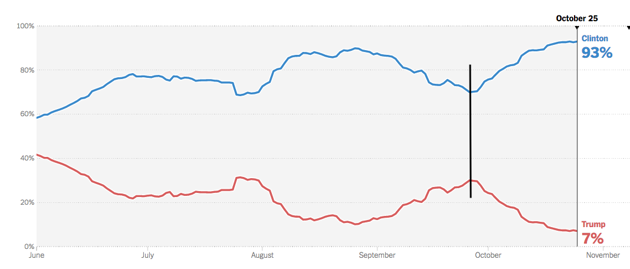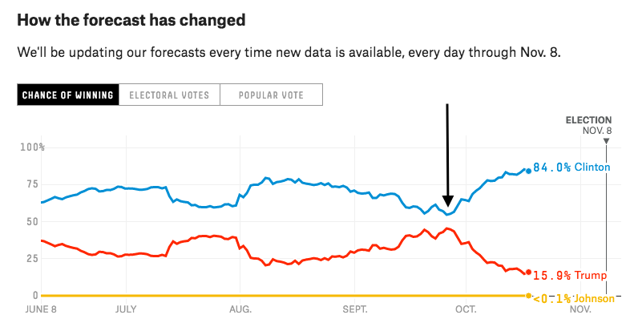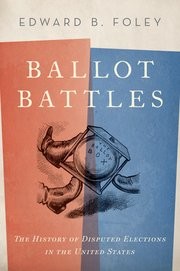A deeply faithful Christian man is stuck on roof at home with massive flooding up to the 2nd floor.
Rowboat comes. He says, “No, I’m waiting for God. I prayed and I know he’s coming.”
2nd Rowboat. “No, I’m waiting for God.”
3rd Rowboat. “No, I’m waiting for God.”
Water rises. The man drowns.
Now he’s meeting God in heaven. The religious man says, “Where were you God? I prayed. I was faithful. I asked you to save me. Why would you abandon me?”
God says, “Hey, I sent you 3 rowboats.”
Did you ever consider Trump is our rowboat?
Maybe God is trying to tell us something important—that now is not the time for a “nice Christian guy” or a “gentleman” or a typical Republican powder puff. Maybe now is the time for a natural born killer, a ruthless fighter, a warrior. Because right about now we need a miracle, or America is finished. Maybe the rules for a gentlemen don’t apply here. Maybe a gentleman and “all-around nice Christian” would lead us to slaughter.
Or do you want another Mitt Romney, Bob Dole, John McCain, Gerald Ford or Paul Ryan?
Did any of them win?
Did they lead the GOP to “the promised land?”
Did they change the direction of America? No, because if you don’t win, you have no say. Paul Ryan couldn’t even deliver his own state, Wisconsin!
And as leader of the House, Paul Ryan rolls over to Obama like my dog rolls over for a scrap of food, or a steak bone, nice, but obedient. I mean Paul Ryan … not my dog. My dog is actually a pretty good defender and loyal.
Maybe God is knocking on your door loudly, but you’re not listening.
Maybe God understands we need a “war leader” at this moment in time.
Maybe God understands if we don’t win this election, America is dead. It’s over. The greatest nation in world history will be gone. Finished. Kaput. Adios.
And with one last breath, maybe what we need to save us at the last second, is someone different. Someone you haven’t ever experienced before, because you weren’t raised in rough and tumble New York where nothing good gets accomplished unless you’re combative, aggressive, outrageous, on offense at all times, and maybe just a tad arrogant too.
Someone with a personality you’ve never seen on stage at your church.
Maybe, just maybe, being a nice gentlemanly Christian would not beat Hillary and her billion dollars, and her best friends in the media who will unleash the dogs of hell upon the GOP nominee.
I guess you think God is only nice and gentlemanly. Really?
Then you’ve missed the whole point of the Bible. When necessary, God is pretty tough. When necessary, God strikes with pain, death and destruction. When necessary, God inflicts vengeance. Maybe you think God couldn’t possibly be associated with someone like Trump.
Trump is too vicious, rude and crude.
When we won WWII, was God “nice”?
Were we gentlemanly when defeating Hitler?
Were we gentlemanly when firebombing Germany?
Were we gentlemanly when dropping atomic bombs on Japan?
Is God ever “nice” on the battlefield? Or does he send us vicious SOB’s like General George S. Patton so the good guys can defeat evil?
That’s a different role than a pastor or church leader. God understands that. And maybe it's time to re-define “nice.”
Maybe Mitt Romney and Paul Ryan aren’t nice at all, because they led us to defeat. And losing again would mean the end of America. And God can’t allow that. Maybe Romney and Ryan mean well, but the road to hell is paved with good intentions. Or maybe they’re just jealous they had their chance and blew it.
Maybe they’d rather help elect Hillary than allow a Trump victory that would make them look weak, feckless and incompetent.
“Even the youths shall faint and be weary, And the young men shall utterly fall, But those who wait on the Lord shall renew their strength; They shall mount up with wings like eagles, They shall run and not be weary, They shall walk and not faint.” (Isiah 40:30-31)
God is about miracles. We don’t need a “nice guy” or a “gentleman” right now. It’s the 4th quarter and we’re losing 14-0. We need a miracle.
So let me repeat my message to Christians: “YOU’RE MISSING THE BOAT.”
I believe Trump is our miracle. I believe Trump is our rowboat. Except he’s more like a battleship!
No one is saying Trump is perfect.
No one is saying Trump is a perfect conservative.
But he is a patriot.
He is a warrior.
He is a capitalist.
He is the right man, at the right time.
Yes, he’s a bit rude and crude and offensive. But that may make him the perfect warrior to save America, American exceptionalism, capitalism and Judeo-Christian values. The choice should be easy.
It’s Trump … or it’s the end of the American dream.
If anything in this article strikes a positive chord with you, please pass it on.
Hello—Love The Atlantic, especially the work that Messrs. Fallows, Graham, Bodenner and others have done in keeping readers grounded, pushing back against the very real risk of voters becoming acclimated to what is a truly exceptional, unprecedented, and unacceptable parade of horribles from the GOP nominee.
I’m a life-long Christian, conservative, and Republican voter who has been led by faith, philosophy, and morality firmly into the #NeverTrump camp. But there are many friends, family, and co-religionists (as might be expected of a Texan) who recirculate the kind of emails and social media postings that were the subject of your last few notes.
I’ve not much to add to the excellent criticism already posted, except to note this: No pro-Trump posting I’ve seen this cycle from a “Christian” point of view has ever actually quoted Christ. Not. One.
Rather, “Christians” trot out David, or less frequently Moses, or Saul, or other flawed Old Testament characters, or cite to God leveling cities and calling for the slaughter of Israel’s enemies. And that, true, is part of the Christian tradition (no quotes there) and a foundation of the faith. But I’m astonished that “Christians” can write and circulate post after post claiming to reconcile their political behavior with their faith without citing to the One upon whom our faith is founded and named.
And there is a reason for this. The One who said “Do not think that I have come to abolish the Law or the Prophets; I have not come to abolish them but to fulfill them” would never approve of citing Old Testament vengeance, wrath, and human failures as an excuse for the opposite of what post-Resurrection behavior should look like. The One who preached the Beatitudes praising the Meek, Those Who Hunger and Thirst for Righteousness, the Merciful, the Pure of Heart, the Peacemakers would never condone the words and actions and appropriateness of Trump to serve as a leader (regardless of what it might mean politically). The One who rebuked the Devil’s offer of “all the kingdoms of the world and their splendor” would never condone those, who call themselves by His name, explicitly acknowledging that they are selling their faith for political power and trying to rationalize that using Holy Scripture.
That the behavior in which Trump engages—actually, by which he defines himself—is no longer something to be expected, welcomed, or excused, and is in fact anathema to God, was more or less Christ’s entire point and the reason for His sacrifice.
Without Christ, there is no Christianity. Absent Him, there is no authority to claim righteousness in His name (and, for His followers, to claim righteousness at all). That’s why things like this disturb me so greatly. The Devil has made American Christians the same offer as he did to Christ on that desert mountain 2,000 years ago, and so many of them have taken him up on it, rather than responding, as their Master taught: “Worship the Lord your God, and serve him only.”
Keep up the good work. #NeverTrump












